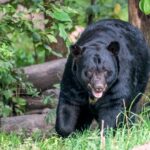Living in Black Bear Country
When living in bear-active areas please keep a clean yard that is free from any odorous attractants (including food and nonfood items). You may save yourself problems and save a bear’s life by following these simple guidelines.
Bear Country Guidelines
- Do not leave garbage cans outside; store in a secure building.
- Rinse empty food containers and wrappers; place in plastic bags to seal in odors. Bleach trash containers regularly.
- Avoid odorous materials in garbage until pick-up day. Keep these “smelly” items in the freezer or wrap securely in newspaper with a few mothballs to mask odors and place in plastic before discarding.
- To learn about bear proof garbage containers you can purchase for home and business use, go to BearProofInc.com.
- The Minnesota Department of Natural Resources also has information and diagrams of bear proof dumpsters and garbage containers. Click here to visit the page.
- If you have bird feeders, including hummingbird, bring them in at night or hang out of reach of bears at least 10 feet in the air on wire suspended between 2 trees. Or, even better, bring them during May thru early September, which is when bears are most active. Use spill pans to prevent seeds from reaching the ground.
- Use only non-food items in a compost pile or use electric fence to protect it from curious bears. Sprinkling the heap with lime assists the composting process and is an effective odor reducer.
- Store pet food bowls inside. When feeding pets outdoors remove uneaten portions and clean food bowls as soon as possible.
- Grease and food caught in barbecue grills or burn barrels can attract bears. Clean grills and barrels regularly; dispose of grease as you would garbage. Do not bury, pour out, or discard grease and food particles in your yard, as they will eventually be detected. Store grills and burn barrels in secured areas whenever possible.
- Locate gardens, orchards, beehives, compost piles, and pet cages in open areas and away from protective cover like forests, thickets, or natural pathways used by bears. Electric fences are effective deterrents. For more information contact any wildlife agency.
- Pick fruits and vegetables regularly as they ripen or be prepared to share. Remove and properly discard of any produce that has dropped to the ground or wilted fruits still left on branches.
- Bears naturally seek insect larvae (ants, yellow jackets, wasps, etc.) as well as various seeds and nuts stashed by rodents. They will dig and claw as they search for these food sources. To avoid potential property damage, remove insect nests from walls and rodent-proof outbuildings.
- Bears like to sniff, claw, sample or rub certain aromatic woods such as cedar or pine and petroleum products including tarpaper, paint turpentine, kerosene, rubber, and charcoal fluid. Store these items in a secured place.
- Black bears usually do not pursue livestock but caution should be taken during birthing times. Corralling young as well as small animals close to barns or inside protective enclosures is recommended. Properly dispose of livestock carcasses and use lime to reduce odors. Bears MAY be attracted to the feed in which you use for your livestock. For chicken coops, ensure that the food is placed inside the chickens’ enclosure so it is not accessible to bears and other wildlife.
- Do not startle a bear while biking, walking, or jogging. Use caution during early morning and late evenings when bears are active and may be feeding along roads. Stay alert. Warn bears you are coming. Use bells or clap loud especially on windy days or when traveling downwind, along streams, around blind curves, or near dense vegetation where bears may not hear, smell or see you.
- Experiment with deterrents such as barking dogs, motion lights, various noisemakers and large-animal scat. Consider using them in a problem area. Be creative but always keep the safety of humans and bears in mind.
Should a bear wander through your yard, he may be just passing through, or he may smell a potential food source.
If he is not rewarded with food, he will move on. If he finds food he will return repeatedly until he is convinced there is no longer the possibility of more food.
At no time should anyone intentionally feed bears because they can associate food with people. Doing so may compromise the safety of both humans and bears.
What should I do if a bear approaches me or comes into my yard?
See the bear encounters guidelines
Remember, bear attacks are EXTREMELY rare, and negative confrontations with bears are usually the result of bears reacting defensively rather than acting aggressively. By understanding their behavior and their needs, you can avoid unpleasant encounters. The sight of a wild bear can be a rewarding experience!





